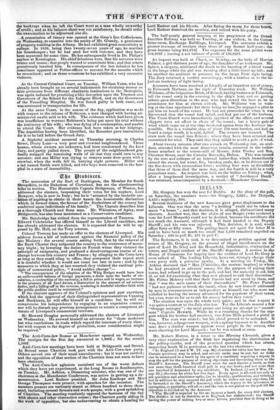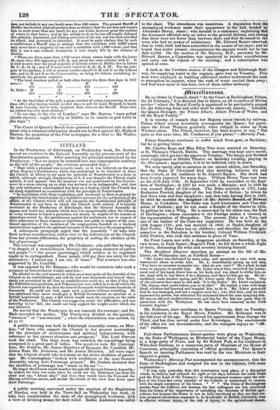IRELAND.
Mr. Gregory has won the seat for Dublin. At the close of the poll, on Saturday, the numbers were—for Gregory, 3,825; for Morpeth, 3,435 ; majority, 390. Several decisions of the new Assessor gave great displeasure to the Liberals. One was that the term "a holding" could not he taken to mean "a house " ; and that decision, it is alleged, disfranchised many electors. Another was, that the claim of one Bergin (who tendered a vote for Lord Morpeth) could not be decided, because his certificate did not reach the Assessor, although it had been handed to the Deputy Sheriff; and his vote was rejected. This decision, it is said, would affect forty or fifty votes. The polling-booth set apart for letter M is said to have been so much too small that 1,100 remained unpolled on Saturday ; 430 in poll B; 431 in poll C.
The Reformers, it is said, h ive determined to petition against the return of Mr. Gregory, on the ground of illegal interference on the part of Lord De Grey and his Household, intimidation, obstruction of voters, and illegal conduct of the Sheriffs' deputies. A motion in the House of Commons for inquiry into the conduct of Lord De Grey is even talked of. The leading Liberals, however, strongly charge their own party with a perverse apathy. At a meeting on Friday, Mr. Arkins declared that" Men [Catholics, the context implies] to whom he had promised to advance money for the purpose of paying their taxes, had refused to go up to the poll, and had the audacity to ask him 5/. or 10/ for exercising what they now pleased to call their discretion." Mr. Peirce Mahony said that their friends had not stood by them, and that " was the main cause of their discomfiture." Mr. Peter Purcell "had not patience to brook the insult, when he saw himself addressed by men in circumstances as independent as himself, hut who were not satisfied in having the money advanced for the payment of their taxes, but even went so far as to ask for money before they voted." The election was upon the whole very quiet ; and in that respect it was quite a contrast to the July election. Yet the Liberals muster a few "Orange outrages "; the most prominent being an attempt to" assassi- nate" Captain Howard. While he was returning thanks for the sup- port which his brother bad received, one John Mills pointed a pistol at him. The man was seized ; but his pistol proved to be unloaded. It was, however, a dangerous weapon, with a spring-bayonet to it. Another man drew a similar weapon against some people in the streets, who were cheering for Lord Morpeth but he was seized at once.
Mr. Robert Hutton, in a letter to the Morning Chronicle, gives a very clear explanation of the Irish law regulating the distribution of the polling-booths. and of the practical question which has arisen, respecting booth M in particular, at the last two elections- . In England (5 and 6 W. IV. cap. 36) elections for cities last but one day. Certain questions may be asked, and ceriain oaths may be put, but no delay can be occasioned in a booth by the agent of a candidate requiring a deputy to stop the poll for the purpose of writing objections and forwarding them to the Sheriff's Assessor. Thc Sheriff must erect for each district s booth, so that not more than thrA hundred shall poll in any one booth, and not more than one hundred if demanded by any candidate. In Ireland, (2 and 3 Wm. IV. cap. 88,) elections for cities last five days. Every agent is allowed not only to ask questions and administer oaths, (as to identity, qualification, and bribery,) but in addition he may suspend the poll while he writes out any objection, (to be forwarded to the Sheriff's Assessor.) which the deputy in his ignorance, or corruption, or partiality, will allow ; and the vote is not placed on the pull till the objection is decided on by the Assessor. "The Sheriff is required by the act to erect a booth for every 600 electors. The division is not by districts, as in England, but alphabetical; the Sheriff having the power of uniting two-or more letters, provided that in doing so he
does not include in any one booth more than 600 voters. The present Sheriff of Dublin has decided (and others have done so before) that the act does not require him to erect more than one booth for any one letter, however great the number of voters in that letter; and by his refusal to do so he has effectually defeated this primary, important, and leading provision of the act, and has thus annulled its object, and perverted its intention. It must be quite obvious that by such a contrivance a Sheriff may so arrange that the candidate with 2,000 voters may never have a majority of one over a candidate with 1,000 voters; and that this is not a case without foundation is now deeply felt by the citizens of Dublin.
"There are there more than 1,709 voters whose names begin with the letter M, more than 900 beginning with B, and about the same number with C. It is well known that the great majority of Liberal voters in Dublin lies in letters M, C, K. 0, Q; and of Consersative voters in E, G, H, S, W. For the pur- pose of comparison, I will at present confine myself to M and C on the Liberal side, and to H and S on the Conservative, as being the letters containing re- spectively the greatest numbers. "The total numbers polled on both sides during the three first days in 1837 were— M
691 536 434 442 In 1642— M 414 353 495 480 *
"At the final close of the poll, a great number of voters,(amountina to more than 400,) after having waited several days to poll for Lord Morpetliin booth M, have formally, but in vain, tendered their votes to the Sheriff. From him no redress has ever been obtained."
"In one day, in the city of London," says Mr. Hutton. "were polled 12,000 electors : ought the city of Dublin to be unable to poll 8,000 in five days"?
The Court of Queen's Bench have granted a conditional rule to show cause why a criminal information should not be filed against Mr. Richard Barrett, the proprietor of the Pilot newspaper, for a libel on Mr. Waller, the late Assessor.



























 Previous page
Previous page